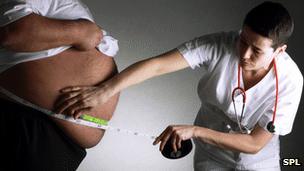'Diabetes-cure' operation explained
- Published

Weight loss surgery can help with diabetes
The reason some patients are cured of type-2 diabetes after a gastric bypass may have been explained by US researchers.
Their animal study showed bypassing the stomach made the intestines work harder, use more energy and keep blood sugar levels under control.
They hope their findings, , will lead to less invasive treatments for the condition.
Diabetes UK said a healthy lifestyle was the best way to avoid the disease.
Type-2 diabetes, which is mostly the result of a bad diet and little exercise, is a growing problem globally.
It leaves people unable to control the amount of sugar in the blood and can culminate in blindness, limb loss and heart disease.
The condition may be managed by eating a healthy diet and keeping weight down, but it may require medication or insulin injections.
Researchers at Boston Children's Hospital, in the US, were investigating how a type of weight loss surgery affected diabetes.
Dr Nicholas Stylopoulos told the Βι¶ΉΤΌΕΔ: "Gastric bypass is the most effective weight loss procedure, but it also cures diabetes.
"If we knew how this worked we could develop new treatments that don't require surgery."
Missing sugar?
Weight loss itself can reduce the symptoms of type-2 diabetes, however, the condition can be seemingly cured before any pounds have been shed.
The challenge for researchers was to figure out where the extra sugar, which should be ending up in the blood, was going.
They performed the operation to connect the entrance to the stomach with the small intestine - essentially bypassing the stomach - on rats.
The animals were then scanned and the route of their meals was traced as they passed through the body.
"Surprisingly, we found the sugar was being used by the intestines - it has to work harder as you've bypassed the stomach," Dr Stylopoulos said.
The intestines also had to go through some internal rebuilding as part of the transition, which also used energy.
The study showed the boost in the intestines' energy needs could account for 64% of the change in blood sugar levels. The remaining effect is thought to be down to weight loss and hormonal changes.
Their plan is to come up with ways to activate the intestines to produce the same effect, but without the need for an operation.
Dr Stylopoulos said: "Most patients would prefer something equally effective, but less invasive."
Dr Matthew Hobbs, the head of research at Diabetes UK, said: "This work gives more details about what happens when gastric bypass surgery is used to treat type-2 diabetes.
"The researchers hope that the findings may give us new treatments in the future that would mimic those effects without the surgical procedure.
"While we would welcome any advances in this area, it is clear any new treatments are many years away.
"What we know now is that avoiding type-2 diabetes by maintaining a healthy balanced diet and being physically active is really important."
- Published23 January 2011
- Published25 April 2013
- Published21 June 2013